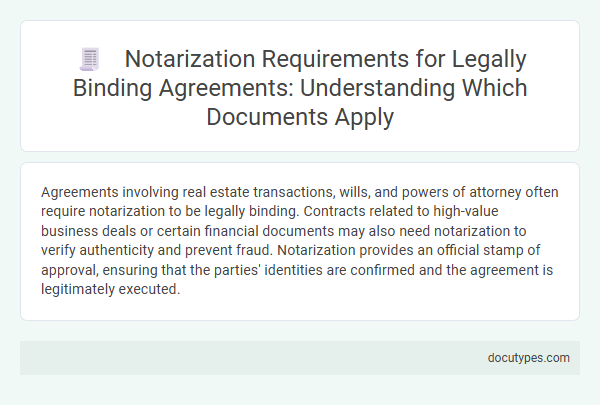Agreements involving real estate transactions, wills, and powers of attorney often require notarization to be legally binding. Contracts related to high-value business deals or certain financial documents may also need notarization to verify authenticity and prevent fraud. Notarization provides an official stamp of approval, ensuring that the parties' identities are confirmed and the agreement is legitimately executed.
Introduction to Notarization in Legal Agreements
Notarization is a formal process where a notary public verifies the authenticity of signatures on legal agreements to ensure their validity. This process helps prevent fraud and provides legal protection to the parties involved by certifying the document.
- Role of Notarization - It confirms the identities of the signatories and the voluntary nature of their signatures on the agreement.
- Types of Agreements Needing Notarization - Real estate contracts, powers of attorney, and certain affidavits typically require notarization to be legally binding.
- Legal Effect - Notarization enhances the enforceability of the agreement and provides evidence of its legitimacy in legal disputes.
Why Notarization Matters for Legally Binding Documents
Notarization ensures the authenticity of signatures on agreements, preventing fraud and disputes. It provides legal validation that the parties involved willingly consented to the terms. This process is crucial for documents like property deeds, powers of attorney, and certain contracts to be legally binding and enforceable.
Types of Agreements Requiring Notarization
| Type of Agreement | Description | Requirement for Notarization |
|---|---|---|
| Real Estate Transactions | Contracts involving the sale, transfer, or mortgage of property | Must be notarized to confirm the authenticity of signatures and prevent fraud |
| Power of Attorney | Documents granting legal authority to another person to act on one's behalf | Notarization is required to validate the grantor's intent and identity |
| Wills and Trusts | Legal instruments for estate planning and asset management | Certain jurisdictions require notarization to ensure legal enforceability |
| Loan Agreements | Contracts outlining terms and conditions for borrowing money | Notarization may be required to verify the identities of parties and prevent disputes |
| Affidavits and Declarations | Sworn statements used as evidence in legal proceedings | Require notarization to confirm the truthfulness under oath |
| Business Agreements | Partnership agreements, contracts involving substantial obligations | Notarization helps ensure parties' identities and intentions are clear |
Standard Notarization Procedures and Compliance
Notarization is a critical step for certain agreements to achieve legal validity, particularly those involving real estate transactions, powers of attorney, and affidavits. Standard notarization procedures require the signer to appear in person before a licensed notary public, present valid identification, and willingly acknowledge the document's content.
Compliance with notarization protocols ensures the document's authenticity and helps prevent fraud or coercion. Your signature is then officially witnessed and recorded, providing a legally binding endorsement recognized by courts and government agencies.
Key Elements Validated by a Notary Public
Agreements that often require notarization to be legally binding include real estate transactions, power of attorney documents, and loan agreements. Key elements validated by a notary public include the identities of all parties involved, their willingness to sign without coercion, and the authenticity of the signatures. Ensuring your agreement is notarized adds an extra layer of legal protection and helps prevent disputes over its validity.
Commonly Notarized Legal Documents
Notarization is often required to ensure the legal validity of certain agreements. Your understanding of which documents need notarization can help prevent disputes and enforceability issues.
- Real Estate Transactions - Deeds, mortgages, and property transfer agreements are commonly notarized to verify identity and consent.
- Power of Attorney - These agreements require notarization to confirm the authenticity of the grantor's signature and intent.
- Affidavits and Oaths - Legal statements made under oath frequently need notarization for official recognition.
Notarization provides an added layer of legal protection, making these agreements more reliable in court.
Exemptions: Agreements Not Requiring Notarization
Not all agreements require notarization to be legally binding. Many contracts are valid and enforceable through signatures alone, depending on the type of agreement and jurisdiction.
Exemptions often include simple agreements like everyday sales contracts, employment agreements, and lease agreements under a year. Your personal agreements, such as informal loans or service contracts, usually fall under these categories and do not need notarization.
Jurisdictional Differences in Notarization Laws
Which agreements require notarization to be legally binding across different jurisdictions? Notarization laws vary significantly depending on the region, affecting the enforceability of certain contracts. Understanding local legal requirements is essential to ensure that agreements meet all formalities for validity.
Remote and Electronic Notarization Trends
Certain agreements require notarization to be legally binding, including real estate transactions, wills, and powers of attorney. Remote and electronic notarization have emerged as valid methods in many jurisdictions, offering greater convenience without compromising legal integrity.
Remote notarization allows you to complete the notarization process online using secure audiovisual technology, eliminating the need for physical presence. Electronic notarization uses digital signatures and seals to authenticate documents quickly and efficiently. These trends are transforming traditional notarization, ensuring timely execution of agreements while maintaining compliance with legal standards.
Which Agreements Need Notarization to Be Legally Binding? Infographic

